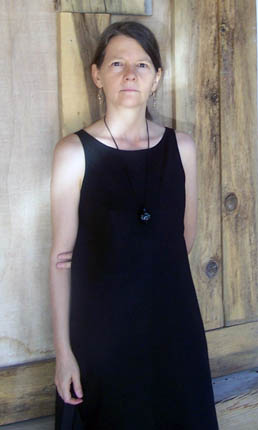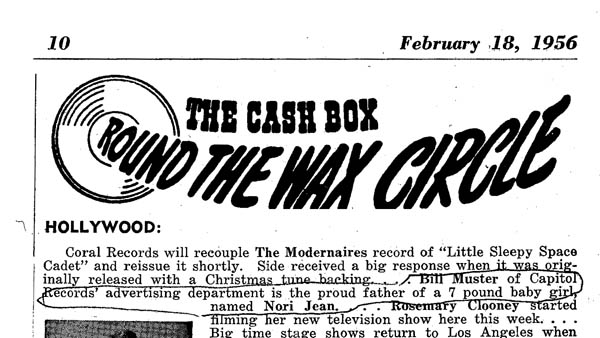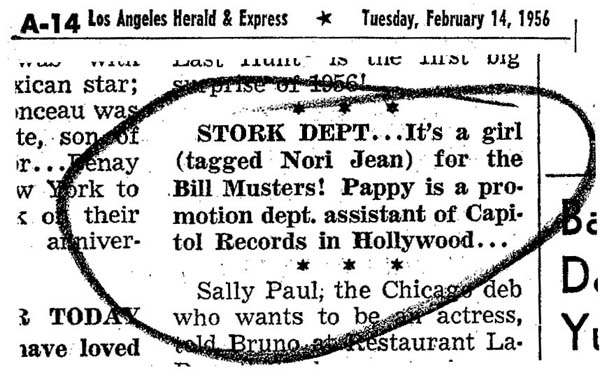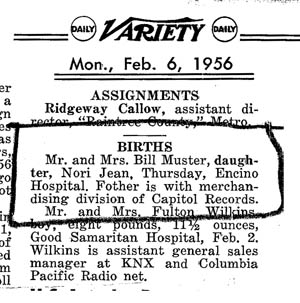
Nori Muster in Oregon, 2008.
Q & A with Nori Muster
Thanksgiving Day, November 27, 2008
Nori: It's funny, but in our family, it was never a bad thing. My mom encouraged my dad. She told him he could get a better job. As soon as Capitol fired him, he immediately got a job at Ampex, one of Capitol's suppliers. Our family moved to Northern California for two years while he worked for Ampex. He earned more and we lived in an Eichler; bought it brand new for $23k. It was a gorgeous house and I have many good memories of it*.
L.O.M.: However, there may be some stigma remaining?
Nori: It was more funny than embarrassing for our family. He later got involved in the Delta Queen Steamboat, which was his destiny. Maybe the only regret my father felt was that he knew I loved the Beatles. He was gone from Capitol five years before the Beatles came in 1964. He asked me at that time if I wanted to meet the Beatles. I told him yes, but that was maybe his only regret, that he could not introduce me. Later, I met George Harrison when I worked for Mukunda Goswami in the Hare Krishna temple.
L.O.M.: Do you regret that he didn't work there when you were a teenager?
Nori: It's not important. My dad worked for Capitol before I was born, and left when I was three. All my life I have been surrounded by musicians. My stepdad is a working musician. Some of my best friends are musicians. The fact that I was around so many of them as a baby kind of explains that to me.
L.O.M.: What made you decide to cover this topic on your website?
Nori: In 2004, when I was starting to do my genealogy, I interviewed my parents, so it was part of my research. We sat down on Feb. 2, 2004, my birthday, and the interview lasted about two hours. I transcribed and posted it at my site a few weeks later. Ever since then, I have heard from many old Capitol people - and their children - and have added to the site based on that. I have done a few additional interviews with my parents and others. My in basket is filled with clippings and materials I want to add. Since the website is a hobby, life gets in the way of working on it as much as I would like.
L.O.M.: What's the thing about your father and stepfather? Your mother married two men who worked for Capitol?
Nori: She was married to my father for twenty years, then they split in 1970. She married Don Hassler in 1970 and they have beem married for forty years. It is like a page out of a Hemingway novel. They all knew each other back in the 1950s. They were young couples back then, starting their families. The genealogist in me just wants to know about the past. I try not to judge it, just learn from it.
L.O.M.: What are your plans for the future?
Nori: I have been writing for publication since 1980, so I will continue.
L.O.M.: What can a writer do to earn money while working on a project?
Nori: That's a good question. It is best to have a day job. People don't like to hear that, but it is true. Or, if you have the opportunity, work in journalism. Many successful writers came up through journalism.
L.O.M.: What type of day job do you recommend for writers?
Nori: Take any job that has no homework. Retail is good because it is mostly just talking. I worked in retail for six years in Los Angeles. It was good to get me away from the computer. It added structure to my week, and it paid pretty well, with a good commission. Structure is good for curing writers' block.
L.O.M.: What is the funniest letter you have received from a visitor to the Capitol Records pages?
Nori: Earlier this month - I am quoting from the email:
"Hmm. Interesting stuff about Capitol Records. Is any or most of it real? It does seem like alot to make-up, but I've heard of a lot of Capitol 'hoax' material. . . ."
It really cracked me up! I still wonder which part he thought was fictional. I wrote back, but he never answered. It has all been fun, if you ask me.



Capitol Records Index